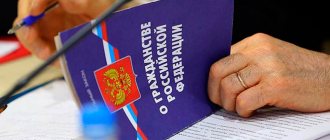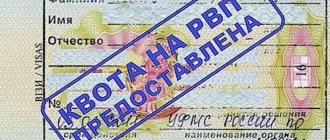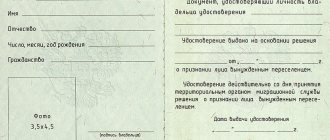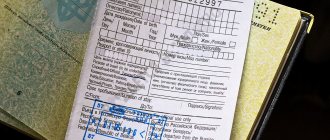23. LEGAL STATUS OF FOREIGN CITIZENS AND STATELESS PERSONS IN THE RF. RIGHT OF ASYLUM
Foreign citizens and stateless persons (stateless persons) have all human rights and freedoms and bear general obligations to the Russian Federation, while the scope of their rights does not include the rights and obligations of citizens of the Russian Federation. Foreign citizens and stateless persons can legally stay
on the territory of the Russian Federation if they have a visa and valid documents proving their identity and recognized on the territory of the Russian Federation as an identity document of a foreign citizen.
a residence permit to legally stay in the Russian Federation.
(i.e., an identification document of a stateless person issued in confirmation of permission for permanent residence in the territory of the Russian Federation to a stateless person or a foreign citizen and confirming their right to freely leave the Russian Federation and return to the Russian Federation). A residence permit is issued by the competent authority of the Russian Federation at the request of a foreign citizen or stateless person.
On the basis of this document, foreigners and stateless persons have the right to freely enter and exit the territory of the Russian Federation upon presentation of valid documents identifying their identity and recognized by the Russian Federation in this capacity.
A residence permit is not provided
if: 1) the entry of a person may harm the defense or security of the state or public order, as well as the protection of public health; 2) during the period of his previous stay in the Russian Federation, a foreign citizen or stateless person was deported; 3) the applicant has an outstanding or unexpunged conviction for committing a crime recognized by the Russian Federation as grave or especially grave; 4) when applying for a visa, a foreign citizen or stateless person was unable to confirm the availability of funds to live in the territory of the Russian Federation and subsequently travel beyond its borders; 5) in relation to a foreign citizen or stateless person, a decision has been made that it is undesirable to stay in the Russian Federation.
In relation to foreign citizens and stateless persons for guilty and punishable acts, administrative expulsion from the Russian Federation (deportation) is allowed.
The deported person must leave the territory of the Russian Federation immediately based on the relevant decision of the competent authorities.
Some categories of persons may be granted political asylum.
Political refuge
is provided in the Russian Federation to foreign citizens and stateless persons who are being persecuted in their country of permanent residence or there is a real threat of becoming a victim of persecution for social and political activities and beliefs that meet the principles recognized by the international community.
Political asylum cannot be granted to persons who support ideas of racial and national hatred, inciting inhumane sentiments and the idea of the superiority of any group of people.
It assumes that the person to whom it is granted has all the rights and freedoms, as well as the obligations of citizens of the Russian Federation, unless otherwise established by federal laws or an international treaty of the Russian Federation.
Asylum is granted on the basis of a person’s application and the Decree of the President of the Russian Federation on the granting of political asylum. This Decree comes into force from the date of its signing.
Table of contents
Rules for the entry of foreigners into the territory of the Russian Federation
- Entry is possible after obtaining a visa permit.
- The previous paragraph does not apply to citizens of those countries with which a free visit agreement has been concluded.
- From Kazakhstan, Belarus, Ukraine, and Kyrgyzstan, entry into the Russian Federation is carried out using internal passports.
- In January 2015, a simplified procedure for registering Ukrainian citizens entering the territory of the Russian Federation was introduced.
- Upon entering the country, a foreigner fills out a migrant card, which indicates the purpose of the visit and the expected departure dates.
- After a foreign citizen arrives in Russia, he must register. Most foreigners are required to complete this procedure within three days. But some countries have privileges. For example, Tajiks can register up to 15 days, Kazakhs – up to 30 days. For Belarusians there is practically no border, and they don’t even fill out migration cards. They have great privileges compared to residents of other states.
If a foreign citizen is staying in Russia temporarily, then his presence in the country is limited to three months, with the exception of the following situations:
- the visa has been extended or a new one has been received;
- received a patent for employment;
- the foreigner has submitted documents to obtain the status of a temporary resident or a residence permit;
- a foreigner enters an educational institution.
The three-month period of stay in the country is reduced if:
- There was forgery or falsification of documents when the entry permit was issued.
- Over the past three years, the foreigner has received administrative fines more than twice or came to the attention of law enforcement agencies (for example, fines for violating traffic rules).
- During the previous entry, the visa was expired without valid reasons.
- A foreigner is deported at the state level (for example, due to detection of espionage).
- The foreigner is extradited to the territory of the country where he committed the crime.
- A voluntary insurance policy has not been issued.
- When crossing the border, a certificate was not provided indicating that the foreigner has sufficient funds to live in the Russian Federation.
- A citizen of another country is on the list non grata and is prohibited from entering Russia.
- On a previous visit, the foreigner did not pay fees or compensate for the costs of his expulsion from the country.
We invite you to watch the video “Are Migrants Necessary? Polls among Russians"
Foreign citizens who have received permission to temporarily reside in the country can remain in this status for up to three years.
Upon receipt of this status, the document is not issued. You just put a stamp in your passport. The exception is stateless persons, who are issued a separate document indicating basic data: first and last name, date and country of birth, etc. A request for this status can be made at the Main Directorate for Migration Issues of the Ministry of Internal Affairs, diplomatic missions or consulates.
Who are citizens, stateless persons and foreigners
When considering the issue of assigning status, requests are sent to various government agencies and, based on the responses from there, the foreigner is given permission or denied. The entire process can take up to six months.
If the status is obtained, then the foreign citizen is required to report his income to the Main Directorate for Migration. Temporary residence permits are issued on the basis of quotas (Table 1). The quota system presupposes a certain number of foreigners who can annually receive the right to temporarily reside in the Russian Federation.
Without quotas, this status is received by the following categories of foreign nationals:
- People born in the RSFSR and who had a USSR passport.
- They have incapacitated direct relatives or children in Russia.
- We entered into a marriage contract with a citizen of the Russian Federation.
- Signed a contract to serve in the armed forces.
- Persons participating in State resettlement programs.
| Region | Number by year | ||
| 2017 | 2019 | 2019 | |
| Central | 38 500 | 33 400 | 28 150 |
| Northwest | 10 000 | 9 300 | 6 610 |
| Southern Federal | 10 000 | 11 500 | 10 400 |
| North Caucasus | 7 200 | 6 400 | 7 050 |
| Privolzhsky | 19 500 | 19 000 | 15 000 |
| Ural Federal | 8 350 | 7 500 | 4 950 |
| Siberian Federal | 21 000 | 17 000 | 13 270 |
| Far Eastern | 8 800 | 6 400 | 4 930 |
Legal status of foreign citizens and stateless persons
Foreign citizen
– a person who has citizenship of a foreign state and does not have citizenship of the Russian Federation.
A stateless person
– a person who does not belong to the citizenship of the Russian Federation and does not have evidence of belonging to the citizenship of another state.
Citizen of the Russian Federation by virtue of Part 1 of Art. 62 of the Constitution of the Russian Federation may have citizenship of a foreign state (dual citizenship). The fact that a Russian citizen has citizenship of a foreign state does not detract from his rights and freedoms and does not relieve him of the responsibilities arising from Russian citizenship.
A citizen of the Russian Federation, if in the specified cases he has acquired citizenship of a foreign state (dual citizenship), is considered in Russia as a Russian citizen. The Russian Federation encourages the acquisition of Russian citizenship by stateless persons and does not prevent them from acquiring another citizenship.
The legal status (legal status) of foreign citizens and stateless persons is formed on the basis of generally recognized principles and norms of international law, international treaties, the law of the country of citizenship (country of residence) of the person, the law of the country of his residence.
A narrower understanding is the legal status (legal status) of a foreign citizen and stateless person as a set of rights granted to these persons and responsibilities assigned to them in the host country.
Individual status
a foreigner, a stateless person in the country of residence - the status of an individual citizen, an individual, the totality of the rights granted to him and the responsibilities assigned to him. Individual status and the scope of its constituent rights and obligations are fluid in nature and change under the influence of many circumstances.
Article 12 of the International Covenant on Civil and Political Rights states the following:
- everyone who is legally present in the territory of any state has the right to free movement and freedom to choose their place of residence within that territory;
- every person has the right to leave any country, including his own;
- the said rights may not be subject to any restrictions other than those provided by law, necessary to protect national security, public order, public health or morals or the rights and freedoms of others, and compatible with other rights recognized in the Covenant.
Adopted by the UN General Assembly in 1985, the Declaration of Human Rights with respect to persons who are not citizens of the country in which they reside, established the general provisions for the status of foreigners.
In accordance with the national regime, Part 3 of Art. 62 of the Constitution of the Russian Federation established that foreign citizens and stateless persons enjoy rights in the Russian Federation and bear responsibilities on an equal basis with Russian citizens, except in cases established by federal law or an international treaty of the Russian Federation.
What does the right to temporary status give?
In case of obtaining temporary residence status, a foreigner receives the right:
- for free medical care;
- legal stay in the country for 3 years;
- registration of your business structures;
- can freely leave the country and return back.
A request for a residence permit can be submitted if a foreigner has lived in the Russian Federation for more than one year. Having collected the necessary documents and sent them to the department for migrant affairs (there should be at least six months left before the end of the temporary status), the foreigner must wait about 6 months for a solution to his issue.
Another entertaining video on the topic: “Really? Foreigners in Russia"
Faster consideration of the issue is carried out for the following population groups:
- Persons whose native language is Russian, or people participating in State resettlement programs.
- Belarusian citizens or specialists in certain fields (3 months).
- People with refugee status (15 days).
In case of successful receipt of a residence permit (for a maximum of 5 years with the right of extension), foreign citizens have the right to:
- Freely leave and return to the country (while staying in the country for at least 180 days annually).
- Receive the same benefits and privileges as ordinary citizens of the Russian Federation, except for the right to vote.
- Work without additional permissions.
Further in the video the topic is revealed: “Protection of the rights of foreigners”








